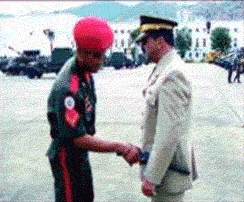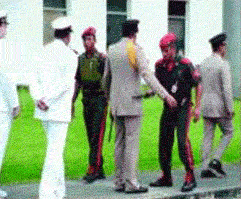Venezuela expects economy to shrink 10.7 percent-- Oil strikes, conflicts over Chavez government fuel losses
Saturday, June 21, 2003 Posted: 2340 GMT (7:40 AM HKT)
CARACAS, Venezuela (CNN-Reuters) -- Venezuela's government said Saturday that it expects the economy to contract by 10.7 percent this year, a bleaker outlook than previously forecast and one of the worst in the history of the world's No. 5 oil exporter.
Finance Minister Tobias Nobrega told Reuters in a telephone interview that the government estimates a 10.7 percent slide for 2003, with a contraction in the second quarter and signs of recovery during the rest of the year.
"This is a preliminary figure, and much depends on the second quarter and ... on the execution of spending and investment and public spending," Nobrega said.
He had previously forecast an 8.9 percent contraction.
Venezuela's economy shrank by 8.9 percent last year and nearly 30 percent in the first quarter of this year after a two-month opposition strike against President Hugo Chavez severely disrupted vital oil output and shipments.
Most analysts paint a more pessimistic picture as conflict over the government of populist Chavez is expected to continue to undermine the economy. The International Monetary Fund forecast Venezuela will post a 17 percent economic contraction this year.
The government has said currency curbs and price controls on basic goods will not be lifted soon. Private business leaders say the controls are sinking the economy deeper into recession by limiting access to dollars needed for imports and external debt payments.
Venezuela is close to collapse and chaos ... could pasties be the answer?
The Sunday Herald
Having survived one coup attempt, President Hugo Chavez is gripping on to power. Elizabeth Mistry in Caracas explains how a humble snack fits into his grand plan
First he ploughed up the city's Central Park to plant lettuces. Then Venezuela's charismatic and impulsive president, Hugo Chavez, announced plans for 'vertical chicken-houses' -- community-run coops on roofs and windowsills of the homes of some of the poorest of inhabitants of the capital, Caracas.
Now Chavez, who earlier this year saw off an opposition-led strike which virtually shut down the country by halting oil production for two months, and who survived a botched coup attempt in April 2002, has put his weight behind a bid to entice visitors to sample the culinary delights of the country the conquistadors named Little Venice.
La ruta de la empanada -- 'the route of the pasty' -- is the government's latest bid to encourage tourism. Along with the smaller bun-like arepas and flat, thicker circles of fried maize dough called cachapas, empanadas form the staple of much of Venezuela's impoverished 20 million population . The department of tourism is spearheading the promotion of the 'pasty tour' saying that the scheme will generate revenue for micro businesses -- often headed by women -- in areas where special pasties will be made. Government is investing millions of Bolivars.
That such a humble, everyday food item should have been chosen to be the focus of a new campaign is not such a surprise as almost all of the president's supporters are from the poorer sectors of society. Since coming to power, Chavez has abolished the school fees that all families had to pay to the state education sector. This, coupled with the introduction -- in some areas -- of a scheme providing children with up to three meals a day, has seen a huge increase in classroom attendance.
It is these policies, along with many others including a plan based on a Cuban programme to combat illiteracy, which are at the heart of the gulf in Venezuelan society today. The country is polarised between those who support the government's Bolivarian Revolution -- simply, a new social contract named after Simon Bolivar, the hero of Venezuelan independence -- and those in opposition, mostly from the middle or upper classes, who have seen standards of living plummet under Chavez.
Some of the loudest criticisms come from 20,000 former senior management staff from the government-run petroleum company, PDVSA. After they supported the strike, they were barred from returning to work although the only notification of this came in a newspaper.
Since February, many of them are to be found at protest sites outside the doors of PDVSA's headquarters, a well-organised group determined to get their jobs and frozen pensions back in spite of the fact that Chavez has called them traitors.
Many of the initiatives of the Chavez project are genuine moves to deal with years of blatant neglect and underinvestment. Others, such as the president's open anti- business stance -- he believes, rightly in many cases, that much of the business community was behind the coup and the strike -- are acts which have only served to deepen the gulf between the two sides.
The political chaos is just one of Venezuela's headaches. Chavez uses daily broadcasts to explain how the gross domestic product will rise. This can be achieved by increasing petrol and gas production, which accounts for 80% of income, but it is not a sign of real growth -- and Finance Minister Tobias Nobrega admitted yesterday that he expected the economy to contract by 10.7% this year.
Until last year tourism was a good source of currency. More than 15% of South America's sixth-largest country is designated as national park . But tourists are put off by the high crime rate in Caracas. While most violent crime is predominantly gang-related, the rising tide of lawlessness threatens other areas of the country and visitor numbers have plummeted. One of the main areas of concern is that the vicious but mainly vocal battles between the two political sides will become violent.
'The parties must reach a solution constitutionally. They have to see this, somehow,' says Antonio Gonzalez Plessman, head of research at the Provea human rights centre in Caracas. 'If there is a referendum on the Chavez administration, as there could be anytime after August 19, when the government will have completed half its term, we will have to have international observers to help.'
Few are prepared to speculate on what will happen, but say the route to recovery will be long and difficult.
22 June 2003
QUÉ ESPERANZA!
Hace un par de años me dirigí al destacamento No. 5 (creo que era el No. 5) de La Guardia Nacional en “La Mariposa” acompañado de un ciudadano coronel -- “RETIRADO” -- de esa misma fuerza. Había un oficial en “La Mariposa” quien supuestamente tenía un buen ejemplar de caballo “paso fino”, el cual era de mi interés adquirir. El “susodicho” coronel (repito: ¡RETIRADO!), serviría de intermediario – “willer & dealer” – ya que sabía quién estaba interesado en vender y quién en comprar.
Nos citamos a las 10 de la mañana en el destacamento, pero como soy muy impulsivo y tremendamente “fosforito”, a las ocho de la mañana ya estaba en el sitio, indagando cuánto podía.
Mientras hacía labor de RP con los guardias allí presentes, dejé colar el hecho de que a las 10 am se presentaría el “Coronel Tal”, quien me acompañaría a las oficinas del “Comandante Mas Cual”, propietario del semental que tenía interés en vender.
Estaba yo sentado plácidamente disfrutando del “friíto” que pega en “La Mariposa” cuando de repente hizo presencia mi amigo el coronel (RETIRADO), lo que produjo una verdadera e IMPRESIONANTE algarabía entre la tropa de aquel destacamento. “¡Llegó mi coronel, llegó mi coronel!”, gritó el sargento segundo que estaba al frente del puesto de entrada. Inmediatamente noté que cualquier soldado que estaba por ahí – holgazaneando -- se levantaba… revisaba su uniforme, su armamento, su “cachucha”.
En Venezuela hay un dicho que dice: “hombre casado, hombre castrado…” y otro: “militar retirado, militar anulado…” Evidentemente hay muchas excepciones a esas reglas a las cuales hacen referencia los sabios refranes vernáculos, pensé yo. Al menos en el Destacamento No. 5 (creo que era el No. 5) de “La Mariposa”, un coronel es coronel… aunque esté retirado y/o casado.
“¡Mi coronel!”, por aquí… “¡Mi coronel!” por allá. “¡Cuánto no hubiera dado yo por haberme recibido de oficial -- “manquesea” -- de la Guardia Nacional… que es la “cenicienta” de las Fuerzas Armadas venezolanas!”, pensé yo al ver aquel impresionante espectáculo. ¿A quién no le gusta que se le guinden de vez en cuando? ¡Eso es muy sabroso!. Eso de llegar a un destacamento y que se le cuadre el regimiento entero debe “dar mucha nota”. No sé si “Mi Coronel” (RETIRADO) estaba ya saturado de “jalabolas” (guatacas o “chupamedias”), pero parecía que tanta condescendencia (“jaladera”, “guataqueria”) no era con él. “!Qué rico es vivir en un país tercermundista!”, me repetía yo internamente. “Mi Coronel” parecía un pavo real de lo “jinchao”, caminando hacia la oficina del encargado de aquel pequeño cuartelito -- que mientan “destacamento” – caminado por los pasillos como si no fuese con él; despreciando cuidadosa, meticulosa y estudiadamente aquellos saludos… desoyendo el ruido que produce el taconeo de los calcañales cuando los soldados se cuadran en posición de firme ante el oficial de alto rango, retirado o no.
El caballo resultó ser un verdadero “flocho” (“penco”), al punto tal que si lo hubiera cambiado por excremento, se hubiera perdido el envase. Pero no perdí mi tiempo. Conocí de cerca la “prosopopeya” militar en cuanto a rendirle homenaje a un coronel – RETIRADO – como mi amigo… a quien le terminé regalando un estupendo caballo enfermo de anemia infecciosa equina, que – luego de varios años – acabó su vida muriendose totalmente en su finca cercana a Puerto La Cruz; pero eso es otra historia que tal vez algún día me anime a contárselas.
Desde ayer está circulando por la INTERNET (yo lo he recibido NO MENOS DE QUINIENTAS VECES), un par de fotos que si no fuera por lo mucho que quiero a esta tierra venezolana, hubiera provocado en mí aquella frase: “Oye vieja, ¡apaga la vela y vámonos!”
Se trata de unas fotos tomadas por el periodista gráfico David Bracamonte – del periódico “El Siglo” – en el acto de ascenso militar. Ambas “instantáneas” las anexo a continuación, pero para quienes no tengan la posibilidad de verlas en sus respectivos “e-mails”, se las describo.

En la primera gráfica se muestra a un oficial del Ejército de la República Bolivariana de Venezuela – ese ejército que mientan “forjador de libertades” – cuadrado ante un soldadito raso (qué se yo… tal vez un distinguido, cabo… o sargentico) de la “Casa Militar” (la institución que vela por la seguridad física de nuestro señor presidente) mientras éste lo ausculta por un lado con un detector de metales para ver si “su oficial” (ACTIVO o “EFECTIVO”) está armado.

La segunda foto es todavía más humillante, porque el oficial se para “en cruz” como los zamuros (las auras tiñozas), mientras el soldadito (el “bocadito”, como le llamaban los rebeldes al soldado raso de Batista) lo requisa en busca de un “hierro” que pudiera ser utilizado en contra del segundo-a-bordo de esta “revolución bonita”: el Teniente Coronel (Ej. Retirado a la fuerza) Hugo Rafael Chávez Frías. ¿Qué tal?
Como ahora yo envío como anexo una copia de cada uno de mis escritos enviados por la red, cualquiera que quiera ver tan indignantes cuadros puede bajar el documento y gritar como yo: “¡Qué esperanza!”
Caracas 4 de julio de 2003
ROBERT ALONSO
Envíen sus comentarios – UNICAMENTE – a robertalonso2003@cantv.net pues los otros buzones colapsan con la cantidad de correo que reciben. --
SOLAMENTE RESPONDEREMOS CORRESPONDENCIA ENVIADA A NUESTRO SERVIDOR DE CANTV
LO MAS RECIENTE QUE HE PUBLICADO EN ESTE PORTAL
DE MI MISMA AUTORÍA
PORTAFOLIO VIRTUAL DE ARTÍCULOS Y ENSAYOS DEL MISMO AUTOR

